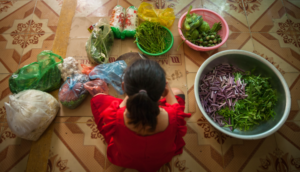This leadership perspective is part of a series on the theme of creating business value and development impact in the WASH sector. The series and accompanying discussion paper are co-produced by Water and Sanitation for the Urban Poor and Business Fights Poverty.
As one of the world’s fastest growing emerging economies, India presents a significant opportunity for future growth for companies like Unilever. At Unilever, we know that in order to grow responsibly we must extend our efforts beyond meeting the current needs of consumers, and also develop innovations that are rooted in ways to help health, wellbeing, livelihoods and environmental impact.
Unilever’s leading toilet hygiene brand Domestos (Domex in India) plays an active role in sanitation. Provision of sanitation can have a range of health and societal impacts, from women’s safety to childhood development.
At Unilever, we believe that business can and must be part of the solution to the global development problems that affect us all. The private sector can bring a wealth of experience and technical expertise, for example innovating in product design and service delivery; harnessing marketing expertise to raise awareness and change behaviours; and using employee and distribution networks to reach underserved communities.
This goes beyond simple CSR. There is a moral imperative for us to act, but there is also a business opportunity. Put simply, if there are more toilets in the world, Unilever has the opportunity to sell more toilet cleaners.
Unilever has a global commitment to help 25 million people gain improved access to a toilet by 2020 by promoting the benefits of using clean toilets and making toilets accessible. To achieve this target, we are working with partners across international civil society and non-government organisations. We believe that to achieve tangible progress in sanitation, and move closer to a world where everyone enjoys the benefits of a clean and safe toilet, we all must play our part—governments, civil society, academia, citizens—and, importantly, business.
Improving sanitation is about much more than building toilets. Sometimes toilets do not get used. Sometimes they are not maintained. We have concluded that for toilets to be used correctly, people need to want them—and in some cases buy them. Where there is demand and willingness to pay, our initiatives are sustainable and durable.
The Domex (Domestos) Toilet Academy programme, one of our programmes running in India and Vietnam, looks at sanitation from a perspective of entrepreneurship. For this programme we train entrepreneurs to promote and sell toilets in their communities. In time, these small enterprises may also sell Unilever products. We take a long-term view that by facilitating the creation of new toilets and sanitation businesses, we will be stimulating a market for cleaning products in the future. We judge the success of the programme through a number of key performance indicators, but principally we look at the commercial sustainability of the enterprises that are created by it. We need to know that this model is empowering entrepreneurs to go and make a living whilst improving the sanitation of the communities reached.
This work is in addition to our partnership with UNICEF. Over the past four years of partnership, 1,320,000 people have been reached with behaviour change sanitation programmes. Of these, 655,000 people are now living in open defecation free communities, benefiting from improved health, safety and dignity. We are also running schools programmes that improve sanitation facilities and teach healthy toilet practices in schools in South Africa, Indonesia and Vietnam.
We believe Domestos’ sanitation programmes are a worthy investment, providing an opportunity to address a social issue and build a business out of it. We could wait for these markets to mature, but the need is pressing and the wait long. The Domex Toilet Academy programme is just one example of how to accelerate market development whilst sustainably improving social impacts and livelihoods as we do so.











One Response
Let us hope ultimate agenda is good for all